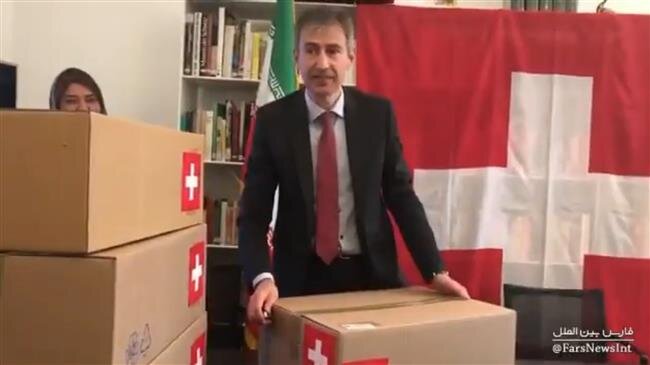Iran dismisses as ‘insufficient’ Swiss-U.S. humanitarian channel

TEHRAN — Tehran says a Swiss-U.S. “humanitarian” channel set up to enable medicine import to Iran is insufficient, reminding that the U.S. is originally banned by the International Court of Justice (ICJ) from subjecting Iran’s much-needed medical supplies to sanctions.
“Medicine and foodstuffs were never subject to sanctions in the first place so that they can now create a channel with such a show,” Foreign Ministry spokesman Abbas Mousavi said on Monday at a press conference.
“We do not recognize any such so-called humanitarian channel,” Mousavi said, according to Press TV.
U.S. President Donald Trump withdrew Washington from the 2015 nuclear deal, known as the JCPOA, in May 2018 and restored the previous sanctions against Iran and ordered new ones.
Tehran has described the U.S. government’s sanctions as “economic war” and “economic terrorism”.
Iran says sanctions on its central bank will prevent it from providing medicine to its citizens.
Foreign Minister Mohammad Javad Zarif said in late 2019 that the United States’ sanctions and economic war on Iran have targeted ordinary people’s health and livelihood.
“There was a time when such warfare was used to simply limit the activities of some countries. However, new warfare of the United States and what Trump has called the ‘economic war’ have targeted the ordinary people’s livelihood and health,” the chief diplomat lamented.
Health Minister Saeed Namaki said back in December 2019 that the United States lies when it says pharmaceuticals and medical equipment are not subject to its sanctions on Iran.
Meanwhile, under Washington’s pressure, Britain, France, and Germany have stopped their transactions with the Islamic Republic.
However, on Thursday, Switzerland launched the so-called Swiss Humanitarian Trade Arrangement (SHTA), claiming it was aimed at facilitating the medicine trade, reportedly using the Central Bank of Iran’s credits. Swiss officials have, however, refused to clarify how such transactions would continue if the CBI ran out of credit with Swiss banks.
Back in October 2018, The Hague-based International Court of Justice? the UN’s principal judicial body issued a ruling ordering the U.S. to halt its unilateral sanctions on “humanitarian” supplies to Iran. The verdict came following a lawsuit lodged by Iran in July of the same year.
In his Monday press conference, Mousavi said Washington is well aware that as per the ruling, it bears an obligation not to block such transactions, adding that these “conditional waivers” from the sanctions will not result in the U.S. war crimes passing into oblivion.
The medicine supplies, he added, were bound to enter the country a year and a half ago, but their imports were blocked by U.S. obstructionism.
The Swiss company tasked with facilitating the transactions “has been paid to do so,” he said, noting, “Our expectations far exceed such measures. And their obligations are hundreds of times more than what they are offering.”
He added that the Islamic Republic welcomes all efforts that are aimed at reducing the pressure faced by the country, but still Switzerland’s initiation of the SHTA, falls short of the expectations.
Zarif also said on Monday that the Swiss channel is insufficient, drawing attention to the ICJ ruling in this regard.
The top diplomat noted that the U.S. keeps pursuing the policy of “maximum pressure” and denying Iran the financial channels that enable it to import medicine.
“This is a small step and we thank the Swiss government for its efforts ... but this channel is not a sign of America’s goodwill at all,” he added.
MH/PA
